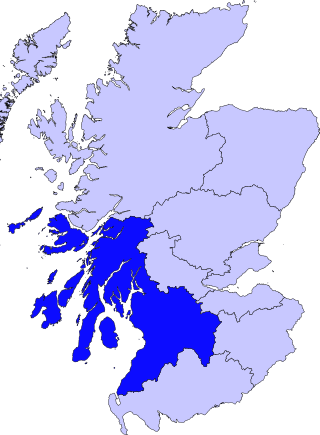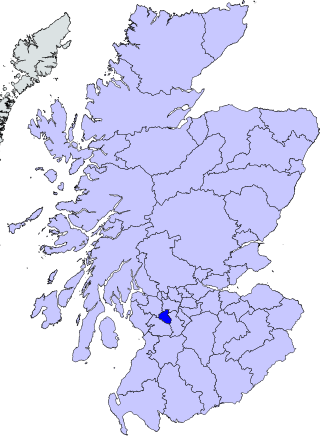
East Renfrewshire is one of 32 council areas of Scotland. It was formed in 1996, as a successor to the Eastwood district of the Strathclyde region. The northeastern part of the council area is close to Glasgow and many of the council area's northern settlements fall into the Greater Glasgow urban area.

Glasgow City Council is the local government authority for Glasgow City council area, Scotland. In its modern form it was created in 1996. Glasgow was formerly governed by a corporation, also known as the town council, from the granting of its first burgh charter in the 1170s until 1975. From 1975 until 1996 the city was governed by City of Glasgow District Council, a lower-tier authority within the Strathclyde region.

Strathclyde was one of nine former local government regions of Scotland created in 1975 by the Local Government (Scotland) Act 1973 and abolished in 1996 by the Local Government etc. (Scotland) Act 1994. The Strathclyde region had 19 districts. The region was named after the early medieval Kingdom of Strathclyde centred on Govan, but covered a broader geographic area than its namesake.

Eastwood was a local government district in the Strathclyde region. It was derived from the civil parish of Eastwood which had been within the county of Renfrewshire, though latterly included areas which had become annexed Lanarkshire and the expanding city of Glasgow. Established in 1975, it covered the parts of the parish outside Glasgow, plus adjoining areas to the south; it was abolished in 1996 to become part of East Renfrewshire.
Argyllshire was a county constituency of the House of Commons of the Parliament of Great Britain from 1708 to 1800 and of the House of Commons of the Parliament of the United Kingdom from 1801 until 1983. The constituency was named Argyll from 1950. The constituency was replaced in 1983 with Argyll and Bute.

Dumbarton was, from 1975 to 1996, one of nineteen local government districts in the Strathclyde region of Scotland, covering the town of Dumbarton and surrounding areas to the north-west of Glasgow.

Hamilton was a local government district in the Strathclyde region of Scotland from 1975 to 1996, lying to the south-east of the regional capital Glasgow.

East Kilbride was a local government district in the Strathclyde region of Scotland from 1975 to 1996, lying to the south of the regional capital Glasgow.

The City of Glasgow was a local government district in the Strathclyde region of Scotland from 1975 to 1996.
George Andrew Leslie was a Scottish politician and veterinary surgeon. He was the Scottish National Party (SNP)'s Senior Vice-Chairman from 1969 to 1971.

Regional elections were held in Scotland on Thursday 6 May 1982, as part of the wider 1982 United Kingdom local elections. Whilst the 1982 elections saw the Conservatives hold up relatively well in England, the Tories did comparatively poorly in Scotland, where their already disadvantageous position worsened. The Conservatives did particularly poorly in Strathclyde, where the Conservative group leader lost his seat.

Elections to Strathclyde Regional Council were held on Thursday 6 May 1982, on the same day as the eight other Scottish regional elections. This was the third election to the regional council following the local government reforms in the 1970s.
The politics of Glasgow, Scotland's largest city by population, are expressed in the deliberations and decisions of Glasgow City Council, in elections to the council, the Scottish Parliament and the UK Parliament.

Elections for the City of Edinburgh District Council took place on Thursday 3 May 1984, alongside elections to the councils of Scotland's various other districts.

The 1995 West Dunbartonshire Council election was held on the 6 April 1995 and were the first for the newly formed unitary authority, which was created under the Local Government etc (Scotland) Act 1994 and replaced the previous two-tier system of local government under Strathclyde Regional Council and Dumbarton and Clydebank District Councils.

Elections for the City of Glasgow District Council took place on Thursday 5 May 1988, alongside elections to the councils of Scotland's various other districts.

Elections for the City of Glasgow District Council took place on 3 May 1984 alongside elections to the councils of the other districts in Scotland. The result was victory for the Labour party, who won 59 of the 66 wards.
Elections for the City of Edinburgh District Council took place on 3 May 1977, alongside elections to the councils of Scotland's various other districts. These were the second election to the City of Edinburgh District Council. Conservatives won a majority with 34 of the Council's 64 seats. Across Scotland the elections saw the Conservatives and SNP make gains, while Labour lost seats. The Glasgow Herald said the Conservatives gaining control of Edinburgh District Council "crowned" what was "a night of considerable success" for the party.
Elections to Strathclyde Regional Council were held on Tuesday 2 May 1978, on the same day as the eight other Scottish regional elections. This was the second election to the regional council following the local government reforms in 1974.

Elections to Glasgow City Council were held on 6 April 1995, the same day as the other Scottish local government elections. The election was the first for the Glasgow City Council; a unitary authority which had been created by the Local Government etc. (Scotland) Act 1994 out of parts of the former City of Glasgow District Council ; wards in Rutherglen and Cambuslang transferred from Glasgow to the new South Lanarkshire area.














